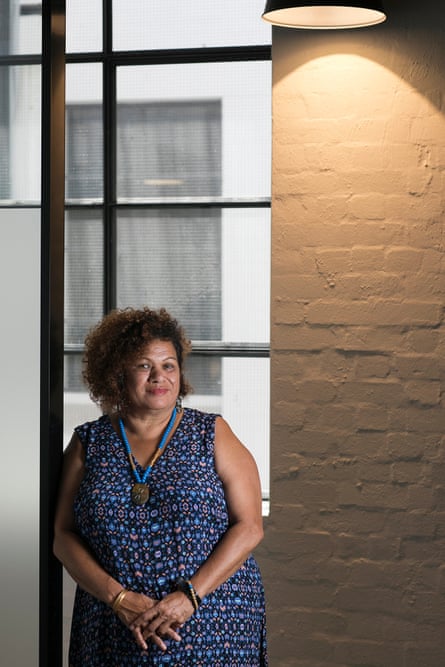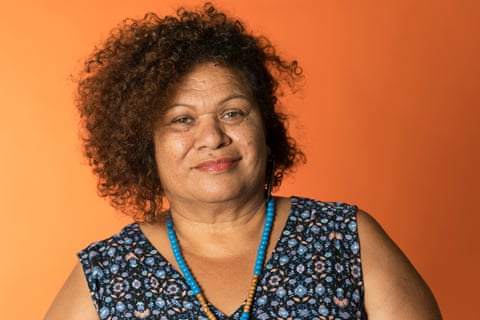In late 2012 Dixie Link-Gordon was sitting in her office at Mudgin-Gal Aboriginal Corporation in Redfern talking to a colleague who had returned from Collarenebri, a town of fewer than 400 people 700km north-west of Sydney.
Truck drivers travelling through the town on the Gwydir Highway had been stopping off and paying Aboriginal girls for sex, her colleague, Ashley Donohue, explained. For a few dollars, or a couple of grams of methamphetamine or marijuana, the girls would climb into their cabs.
“They were paying them for basically what I would call sexual abuse,” Link-Gordon says.
It wasn’t a new story. Reports of soliciting by truck drivers frequenting the flat, dusty roads of north-west New South Wales had bubbled into the media in 2008.
But, this time, it had become too much.
For the first time in her 29 years working to support women who had experienced domestic violence and sexual assault, Link-Gordon had a meltdown.
“I think I just had heard one too many child sexual assault situations, and I jumped on a plane and I went to Vanuatu for a week, on my lonesome,” she says.
She and Donohue called Karen Willis, then executive director of Rape and Domestic Violence Services Australia, to talk about possible solutions.
“We just started to open up about vicarious trauma and going, well, this is happening to us, we considered ourselves pretty experienced women, what is actually happening to the women who are out and about and coming across it every day in communities?” Link-Gordon says.
The solution they came up with was Hey Sis, a support program for Aboriginal and Torres Strait Islander women – aunties, grandmothers, and mothers – who in turn support their communities.
“They are the go-to ladies,” Link-Gordon says – women who are already holding the stories of violence and abuse in their communities but do not necessarily know what services are available to provide additional help.
Hey Sis held community forums train women in how to recognise vicarious trauma in themselves and in others, and how to provide practical support to victims of domestic and sexual violence.
It ran for 18 months before the money scraped together from other projects ran out. A funding application is still sitting, unanswered, in the bowels of the NSW government. It’s an all-too-common fate for Indigenous-led programs.
“We’re not asking for millions and millions of dollars, we just want safer communities,” Link-Gordon says.
The Goreng Goreng woman grew up in Brisbane, the eldest of nine daughters. She moved to Redfern in 1980, aged 18, and never left; it was the first place she’d seen black faces like hers walking down the street.
About six years later, a woman who ran the preschool attended by her four youngest children encouraged her to apply to a few short courses at Tafe and, later, to take up a traineeship at Stepping Out Housing Program, a homeless service that focused on survivors of family and sexual violence.
During that training, she uncovered buried memories of her own sexual abuse at the hands of a family member.
“There wasn’t any time to fall apart,” she says. “I would be lying if I said I wasn’t a bit emotional but I suppose I was … always conscious of living in the present.”
She has six children – two boys and four girls – and worked and studied full time, later putting herself through university despite dropping out of high school on the day she turned 15.

“I think it played out its own way, I was overzealous with my children … overprotective of them,” she says. “Almost to the point of suffocating them, the girls will say at times. I can’t say I have a lot of regrets about that, I feel that I’ve been the best mum that I can be.
“Growing my boys up was about keeping them out of jail, because I had a father who was a habitual criminal. I got through that – my boys are young men who work really hard for their families, they’re good, loving guys, and they’ve never seen the inside of a cell. That’s big. For me, that was big.
“There was so much for me to worry about other than thinking about [being abused]. I won’t say that I’m detached from that little girl but I don’t live in that pain.”
Talking about abuse is “everyday yarning,” for Link-Gordon but it is not commonly spoken about in Indigenous communities.
It’s not taboo but it is painful. Experiences of trauma have been building on Indigenous families like layers of sediment since colonisation. Link-Gordon is a good talker; she sees it as her role to start those difficult conversations.
“I’ve been in a room where there is three generations of women sexually assaulted, sexually abused within their community,” she says. “Those type of cycles, those type of levels of abuse, they are deeply, deeply entrenched.”
It’s a cycle that has its roots in the “absolute culture of violence woven into the fabric of Australian society”, she says, adding: “At the end of the day we’re still a people that need to rebuild from what’s happened to us.
“Everybody can’t just run off and go to independent counselling and we’re all going to be happy, laughing. We’re still shaking at the rafters.”
In a perfect world Aboriginal and Torres Strait Islander peoples would initiate those conversations in their own communities, she says. Government support would come in later, as a way to keep those conversations going.
“Really straight-up talks, courageous talks, where you say to your own brother and sisters, cousins, whatever, that this is not acceptable,” she says. “And you know it doesn’t mean that you love that relative any less, but you’re telling them, you’re being direct with them: we need to be able to be looking after each other and violence within our homes is not acceptable.”
